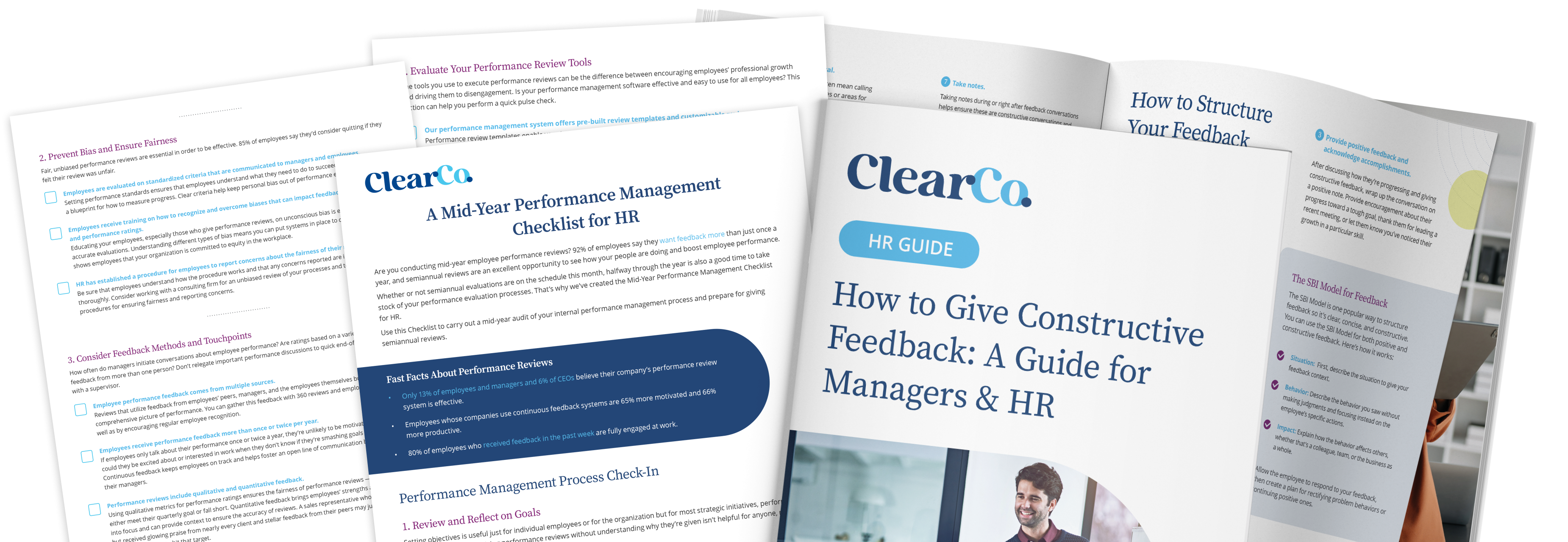This article about performance management vs. performance appraisals was originally published in October 2020. It was updated with new information in June 2024.
It might seem obvious that companies’ approach to employee performance management is a critical factor in their success. But this strategy is often put on the back burner — only 26% of companies in North America say their performance management process is effective. Poll after poll and survey after survey point to the same recurring issues: infrequent feedback, inadequate performance appraisals, and unreliable review processes.
So what’s causing the disconnect between what we know about the importance of performance management strategy and regular reviews and executing them?
One culprit is a lack of understanding of the meaning of performance management vs. performance appraisals. While these terms are often used interchangeably, they actually refer to two distinct processes. Your human resources team must understand these important terms and their impact so you can help employees reach their full potential.
While performance appraisals work in tandem with performance management, the two are not the same. They serve distinct purposes: performance management is the end-to-end process of managing talent and goals throughout the lifecycle. Performance appraisals or reviews are scheduled conversations where performance is evaluated against set criteria. It’s an important distinction, and understanding the difference between performance management and performance appraisals is the key to a better talent strategy.
Keep reading for a breakdown of the terms, as well as insight into best practices and effective software systems for top-notch employee performance management.
What Is Performance Management?
Performance management refers to a company’s strategic process for measuring and improving employee performance. A performance management strategy is a guide to how to set employees up for success, provide resources and motivation to achieve their goals, and respond to poor or outstanding performance. While it does include the performance appraisal process, it also encompasses everything else you do to support employee productivity:
- Set goals (both personal and professional) and track progress
- Give informal feedback, like via one-on-one meetings or instant message
- Make it easy for employees to ask questions and get guidance
- Identify and develop employees’ strengths and weaknesses
- Recognize great performance and big milestones
Performance management is a continuous process and is not limited to evaluating employee productivity alone. The most effective strategies include a regular cycle of formal reviews and goal-setting supported by:
- Frequent one-on-one performance conversations
- Personalized learning paths and development opportunities
- Employee recognition
All of these processes working together are what make the difference between a proactive, empowering performance management strategy and an ineffective, reactive one.
Performance management helps ensure everyone in your organization understands how their role fits into the big picture. Whether it’s spotting and addressing issues before they snowball into bigger problems or finding new ways to challenge high performers, a performance management strategy also helps HR better support employees.
It’s also good for their well-being, fostering an environment where employees are happy and engaged in their work. Opportunities to learn and grow their skills — skills that help propel your company forward —and a supportive culture make it clear that their individual success and career development are important to your company.
It’s no surprise that this is what makes a successful business: the better we meet the needs of every employee, the better the business performs as a whole.
What Are Performance Appraisals?
Performance appraisals, also called employee performance reviews, are a routine practice at many organizations. They’re formal evaluations of employees’ work over a period of time, usually six months to a year, with ratings based on clear, fair criteria.
During these mid-year or annual reviews, managers and their direct reports look back and compare goals to goal progress. They discuss how the employee can improve, what they’re best at, and what they want to learn. It’s a chance for employees to move forward in their careers and for managers to identify high-potential and high-performing employees.
The most effective way to approach appraisals is by focusing on employees’ strengths and on the future. That means encouraging them to explore the areas they excel, whether by planning a learning path or introducing them to a mentor to help them grow. It means collaborating to set goals that are challenging but achievable.
Effective performance appraisals are part of a broader talent management strategy that pushes your employees to reach their full potential. When you continuously talk to your employees about how they’re doing and what they can achieve at your company, you help them envision their future there. That increases the likelihood they’ll become invested in and loyal to your organization.
Get exclusive resources for revamping your semiannual reviews —
Download ClearCompany’s Mid-Year Performance Bundle.
How Performance Management and Performance Appraisals Work Together
It makes for a good title, but it’s really not a question of performance management vs. performance appraisals, rather, the two work together. Performance appraisals play a critical role in performance management strategy. Performance management is the backbone of a good talent management strategy.
When you think about how performance management, appraisals, and your overall talent management strategy are related, you might consider these questions instead:
- How does your performance appraisal system fit into your performance management strategy?
For example: Formal appraisals are given twice a year in addition to weekly one-on-ones with managers. - How does your performance management strategy make it possible for you to give fair, effective performance reviews?
For example: During the weekly check-ins, managers discuss expectations and give recognition. That means employees always know what’s required of them to achieve high performance ratings and encouragement motivates them to do their best. - How are your talent management and performance management strategies informed by each other?
For example: A goal of your talent management strategy is improving retention, and your performance management strategy includes increasing internal mobility to help meet that goal.
When performance management and performance appraisals are used in harmony, the effects aren’t just possible —they’re proven. By defining goals, checking in on performance intentionally and often, and expressing appreciation, you show employees you care about them. That can have an incredibly positive impact on your company culture, resulting in happier, more engaged employees who are less likely to quit and more productive.
Support Your Performance Strategy With Leading Software
With a performance management system, HR professionals and managers have the tools they need to seamlessly achieve goal alignment, increase employee engagement, and gain tangible insights into your workforce that you can apply to your talent management strategy. Managers can track and monitor employee performance while highlighting and focusing on what's most important for the needs of your organization along the way.
The solution provides tools that make it easier to:
- Schedule, manage, and track performance conversations
- Provide real-time feedback — in context — that can be implemented immediately.
- Get individual, team, and organizational goals aligned
- Celebrate a job well done and get peer encouragement and socialization
- Track performance and trends across individuals, managers, and teams
The best performance management software also makes scheduling reviews and collecting feedback easy and seamless. You can create, automate, and manage every type of performance review that’s best for you, including:
- New Hire Reviews (30, 60, 90-Day Reviews)
- Quarterly, Bi-Annual, or Annual Performance Reviews
- Competency and Roles-Based Reviews
- Time-Based Reviews
- Peer and 360 Reviews
These reviews are completely customizable to your needs. You can do everything from building your own scales, questions, and sections, to creating a multi-stage process that includes review, approval, and timed stages. You can build the best review for your organization, schedule it, automate it, and collect and manage feedback — all in one place.
Get a Demo of ClearCompany Performance Management
There’s no mystery around what makes an employee-first, learning-centered performance management strategy and productive performance appraisals. The research is clear that frequent performance conversations, goal-setting, regular formal reviews based on clearly defined criteria, and employee recognition are all integral if you want to foster productive, engaged high performers. You know what to do, you just need the right tools to execute your strategy.
You can do all this and more with the ClearCompany Performance Management System. Our top-rated software is built to support a comprehensive, data-backed performance strategy:
- Ready-to-launch performance appraisal templates and customizable reviews
- Automatic notifications and reminders encourage review participation
- 1:1 Workspaces simplify communication and collaboration
- Celebrations and Shout Outs make gratitude and praise the norm
- Goal Planning increases transparency and motivates great work
- In-depth reporting and analytics provide valuable performance insights
To learn more about ClearCompany, reach out to our experts to schedule your free demo today.


.png)
